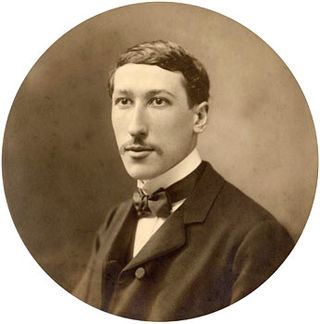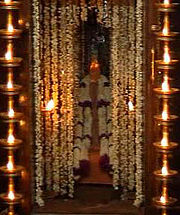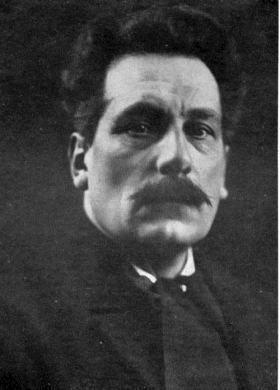Related Research Articles

Charles de Marguetel de Saint-Denis, seigneur de Saint-Évremond was a French soldier, hedonist, essayist and literary critic. After 1661, he lived in exile, mainly in England, as a consequence of his attack on French policy at the time of the Peace of the Pyrenees (1659). He is buried in Poets' Corner, Westminster Abbey. He wrote for his friends and did not intend his work to be published, although a few of his pieces were leaked in his lifetime. The first full collection of his works was published in London in 1705, after his death.

René Jean-Marie-Joseph Guénon, also known as Abdalwahid Yahia, was a French intellectual who remains an influential figure in the domain of metaphysics, having written on topics ranging from esotericism, "sacred science" and "traditional studies" to symbolism and initiation.

Traditionalism, also sometimes known as Perennialism, posits the existence of a perennial wisdom or perennial philosophy, primordial and universal truths which form the source for, and are shared by, all the major world religions. Historian Mark Sedgwick identifies René Guénon, Ananda Coomaraswamy, Julius Evola, Mircea Eliade, Frithjof Schuon, Seyyed Hossein Nasr and Alexandr Dugin to be the seven most prominent Traditionalists.

Titus Burckhardt was a Swiss writer and a leading member of the Perennialist or Traditionalist School. He was the author of numerous works on metaphysics, cosmology, anthropology, esoterism, alchemy, Sufism, symbolism and sacred art.

Jean-Jacques Barthélemy was a French Catholic clergyman, archaeologist, numismatologist and scholar who became the first person to decipher an extinct language. He deciphered the Palmyrene alphabet in 1754 and the Phoenician alphabet in 1758.

Jean Borella is a Christian philosopher and theologian. Borella's works are inspired by Ancient and Christian Neoplatonism, but also by the Traditionalist School of René Guénon and Frithjof Schuon.
Robert Flacelière was a scholar of Classical Greek. He was educated at the Collège Sainte-Barbe, the Lycée Henri IV and the École Normale Supérieure. From 1925 to 1930, he was a member of the French School in Athens and from 1932-1948 a Professor of the Faculty of Letters at University of Lyon. He was then appointed to the Chair of Greek Language and Literature at the University of Paris, a post he held until 1963 when he was appointed Director of the École Normale Supérieure.
Marie Delcourt was a Belgian classical philologist. She studied at the University of Liège (ULg), and obtained a PhD in classical philology in 1919. Under the German occupation of Belgium during World War I she was active in the Dame Blanche resistance network. She was the first female part-time lecturer at the ULg.

Jean Tulard is a French academic and historian. Considered one of the best specialists of Napoleon Bonaparte and the Napoleonic era, he is nicknamed by his peers "the master of Napoleonic studies".
Jean Chevalier (1906–1993) was a French writer, philosopher, and theologian, best known for his co-authorship of the Dictionnaire des symboles, first printed in 1969 by publisher Éditions Robert Laffont.

The Kailasapuram Ayya Vaikundar Temple is a Hindu temple in Peruvilai village, Kailasapuram, Tamil Nadu, India. It is dedicated to Ayya Vaikundar, a manu Narayana avatar which arose from the sea and manifested in Mudisoodam Perumal. In 1836, Ayya founded Samathva Samajam, a human rights movement which contributed to the Independence of India and was influenced by the development of socialism in Europe.

Jean Varenne was a French Indologist and a prominent figure of the Nouvelle Droite. He taught Sanskrit at the Aix-Marseille University, then at Jean Moulin University Lyon 3, where he was eventually nominated professor emeritus. Varenne has also been a visiting professor at the University of Chicago, and at other universities in India, Cambodia and Mexico.
Daniel Babut was a French Hellenist, specialising in Greek philosophy, especially the Moralia of Plutarch. He was employed by the Lumière University Lyon 2 from 1963 to 1992. He was born in Lille.

Pierre Lory is a director of studies at the École pratique des hautes études, holder of the Chair of Muslim mysticism of the Ve section, religious sciences.
John Scheid is a French historian. A specialist of ancient Rome, he has been a professor at the Collège de France since 2001.
Jean Robin is a French writer, essayist, and conspiracy theorist particularly interested in occult and esoteric issues, secret societies, and their influence throughout history. He died on Christmas Day 2024.

René François Ghilbert, known as René Ghil, was a French poet. He was a disciple of Stéphane Mallarmé, a major contributor to the symbolist movement in France, although they later had a falling out over ideological differences. Ghil published a series a short stories which together were called the Traité du Verbe. He worked extensively on a new system of poetic language in reaction to the Decadent Movement and Symbolism. Owing to his widespread use of personal syntax and neological vocabulary, much of Ghil's work was inaccessible, and his own contemporaries labelled it confusing. However, his works gained wider attention after his death.

Michel Zink is a French writer, medievalist, philologist, and professor of French literature, particularly that of the Middle Ages. He is the Permanent Secretary of the Académie des Inscriptions et Belles-Lettres, a title he has held since 2011, and was elected to the Académie française in 2017. In addition to his academic work, he has also written historical crime novels, one of which continues the story of Arsène Lupin.
The Prix Bordin is a series of prizes awarded annually by each of the five institutions making up the Institut Français since 1835.
Annick du Réau de La Gaignonnière, better known by the pseudonym Annick de Souzenelle, was a French writer who studied spirituality. De Souzenelle died on 11 August 2024, at the age of 101.
References
- 1 2 3 4 5 "Regard sur l'œuvre de Jean Hani" in Connaissance des Religions, Dec. 1992.
- 1 2 La religion Egyptienne dans la pensée de Plutarque, Paris, Les belles lettres, 1976. Library record at Paris Sorbonne IV, 1971, Worldcat ref. 490686029
- ↑ The Divine Liturgy: Insights Into Its Mystery, 2008.
- ↑ The Symbolism of the Christian Temple, 2007.
- ↑ Plutarque, Oeuvres morales Tome VIII : Traités 42-45. He also collaborated in Plutarque, Oeuvres morales Tome II : Traités 10-14.
- 1 2 See bibliography below.